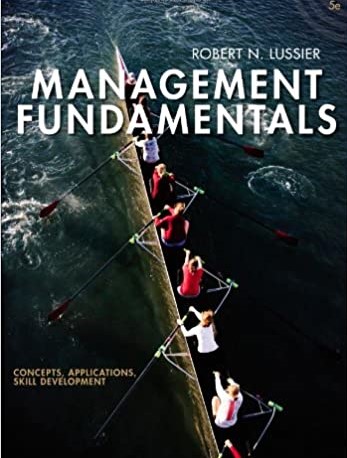
Management Fundamentals 5th Edition by Robert Lussier
Edition 5ISBN: 978-1111577520
Management Fundamentals 5th Edition by Robert Lussier
Edition 5ISBN: 978-1111577520 Exercise 8
Objective
To develop a career plan.
Skills
The primary skills developed through this exercise are:
1. Management skill - decision making (developing career plans)
2. AACSB competency - reflective thinking skills
3. Management function - planning
Preparing for Skill Builder 1
Answering the following questions will help you develop a career plan. Use additional paper if needed. If your instructor asks you to do this exercise in class, do not reveal anything about yourself that you prefer not to share with classmates.
Step 1. Complete a self-assessment
a. Write two or three statements that answer the question "Who am I?"
b. Write about two or three of your major accomplishments. (They can be in school, work, sports, or hobbies.) List the skills it took to accomplish each one.
c. Identify skills and abilities you already possess that you can use in your career (for example, skills related to planning, organizing, communicating, or leading).
Step 2. Determine your career preferences
a. What type of industry would you like to work in? (List as many as interest you.)
b. What type and size of organization do you want to work for?
c. List in priority order, beginning with the most important, the five factors that will most influence your job/career decisions (examples are opportunity for advancement, challenge, security, salary, hours, location of job, travel involved, educational opportunities, recognition, prestige, environment, coworkers, boss, responsibility, and variety of tasks).
d. Describe the perfect job.
e. What type of job(s) do you want during your career (marketing, finance, operations, personnel, and so forth)? After selecting a field, select a specific job (for example, salesperson, manager, or accountant).
Step 3. Set career objectives
a. What are your short-term objectives for the first year after graduation?
b. What are your intermediate-term objectives (the second through fifth years after graduation)?
c. What are your long-range objectives?
Step 4. Develop a plan
Develop an action plan to help you achieve your objectives. Be sure to state deadlines for each action you plan to take.
To develop a career plan.
Skills
The primary skills developed through this exercise are:
1. Management skill - decision making (developing career plans)
2. AACSB competency - reflective thinking skills
3. Management function - planning
Preparing for Skill Builder 1
Answering the following questions will help you develop a career plan. Use additional paper if needed. If your instructor asks you to do this exercise in class, do not reveal anything about yourself that you prefer not to share with classmates.
Step 1. Complete a self-assessment
a. Write two or three statements that answer the question "Who am I?"
b. Write about two or three of your major accomplishments. (They can be in school, work, sports, or hobbies.) List the skills it took to accomplish each one.
c. Identify skills and abilities you already possess that you can use in your career (for example, skills related to planning, organizing, communicating, or leading).
Step 2. Determine your career preferences
a. What type of industry would you like to work in? (List as many as interest you.)
b. What type and size of organization do you want to work for?
c. List in priority order, beginning with the most important, the five factors that will most influence your job/career decisions (examples are opportunity for advancement, challenge, security, salary, hours, location of job, travel involved, educational opportunities, recognition, prestige, environment, coworkers, boss, responsibility, and variety of tasks).
d. Describe the perfect job.
e. What type of job(s) do you want during your career (marketing, finance, operations, personnel, and so forth)? After selecting a field, select a specific job (for example, salesperson, manager, or accountant).
Step 3. Set career objectives
a. What are your short-term objectives for the first year after graduation?
b. What are your intermediate-term objectives (the second through fifth years after graduation)?
c. What are your long-range objectives?
Step 4. Develop a plan
Develop an action plan to help you achieve your objectives. Be sure to state deadlines for each action you plan to take.
Explanation

This question doesn’t have an expert verified answer yet, let Examlex AI Copilot help.
Management Fundamentals 5th Edition by Robert Lussier
Why don’t you like this exercise?
Other Minimum 8 character and maximum 255 character
Character 255


